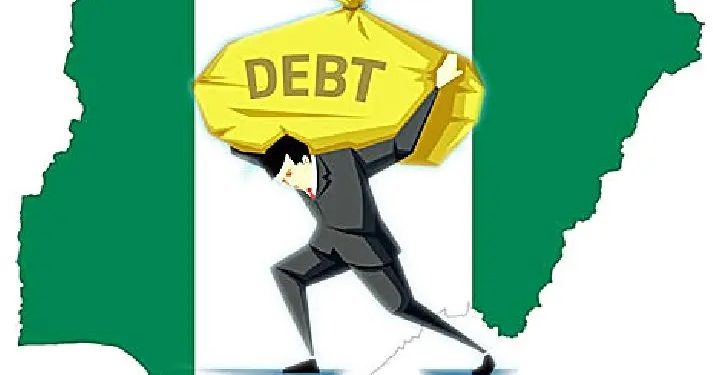Nigeria’s public debt stock is projected to surge to N130 trillion by the end of 2024, according to a recent report by Afrinvest, an investment management firm. This alarming increase raises significant concerns about the country’s debt-to-GDP ratio.
The report, titled “Bank Recapitalisation, Catalyst for a $1tn Economy,” was unveiled in Abuja and highlighted the rapid growth of Nigeria’s public debt, which includes both external and domestic obligations. Data from the National Bureau of Statistics indicated that the public debt stood at N121.67 trillion in the first quarter of 2024, up from N97.34 trillion in the fourth quarter of 2023, representing a 24.99% increase quarter-on-quarter.
Afrinvest’s projections suggest that by the end of 2024, the fiscal deficit, total public debt stock, debt-to-GDP ratio, and debt-servicing-to-revenue ratio will surpass N13.0 trillion, N130 trillion, 55%, and 60%, respectively.
As of Q1 2024, Nigeria’s public debt composition was N77.5 trillion (63.6%) in domestic debt and N44.2 trillion (36.4%) in external debt. The domestic debt included N44.8 trillion in Federal Government bonds, N20.3 trillion in Treasury bills, and N12.4 trillion in other forms of domestic debt. On the external front, multilateral creditors accounted for N14.3 trillion, bilateral creditors for N10.9 trillion, and commercial creditors for N19.0 trillion.
The report also criticized the 2024 budget for its “overly optimistic” revenue assumptions, which Afrinvest believes could lead to another year of disappointing budget performance. The report noted that the expectation of deriving 43.9% of projected revenue from oil and other minerals is unrealistic, given past performance.
Afrinvest’s analysis of the 2023 budget revealed a consistent trend of under-performance, with actual revenue exceeding budgeted amounts by 7.6%, totaling N11.9 trillion. However, aggregate expenditure rose by 31.8% to N18.8 trillion, resulting in a significant deficit of N46.9 trillion.
The report highlighted a worrying trend: the Federal Government’s share of total public debt stock rose by 44.6% year-on-year to N487.3 trillion, making up 89.7% of the total debt by year-end. Afrinvest warned that the government’s extensive borrowing plans could negatively impact banks’ deposits, as attractive yields on risk-free government securities might divert funds away from bank deposits.
Afrinvest praised the Central Bank of Nigeria (CBN) for its recent policy measures, including the reduction of Bureau De Change operators, the consolidation of multiple forex segments, and the periodic sales of forex to approved BDCs at discounted rates. These steps have reportedly enhanced compliance and improved supervision of BDC operations.
However, the report cautioned that the short-term pain expected from these policies has become prolonged due to inadequate forex reserves to meet market demands. Afrinvest recommended exploring alternative forex sources, such as bilateral loans, natural resource-tied loans, debt-for-nature swaps, and asset concessions, to provide temporary relief.
To achieve long-term stability in the forex market, the report emphasized the need for supportive fiscal policies to boost traditional forex inflows from oil production, remittances, and foreign portfolio investments.
Overall, Afrinvest’s report underscores the urgent need for Nigeria to implement robust fiscal and monetary policies to manage its growing public debt and ensure sustainable economic growth.









